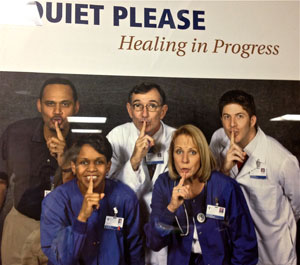I hope this never happens to you, but it’s usually inevitable that one day either you or a loved one may end up in the hospital. This is most typical when caring for elderly parents, as happened to me in the last couple of years, yet you never know when you’ll end up there, too. And what we all need when in a hospital is an informed advocate. This can make the difference between life and death, as I just experienced.
My recent foray into the hospital scene when my mother became ill taught me this lesson. Generally, most practitioners there truly have each patient’s best interests at heart. They care, they love their work and they want to do the best job they can. Despite this, I have found the hospital system to be fractured; in spite of all the individual efforts made to save lives and heal people, it can actually cause the opposite: decline and death.
The major reason I see for this occurrence is at the very basis of western medicine itself: specialty-ism. In the medical world of microscopically dismantling the human body to discover how it works and to develop medicines for its diseased parts, the whole person is lost. The same arises in hospitals where there’s a specialist doctor for each system of the body who effectively helps that organ’s functions, but who also misses the rest of the body and personhood as a whole. This is great in terms of expertise, but if you are the patient, it could mean your healing process is not necessarily served, and even more so, it may make you worse.
For example, you may undergo a separate blood draw for each doctor, sometimes occurring every two hours and despite the fact that you might be anemic to begin with. Or you may have one doctor prescribe a medication that another doctor already knows doesn’t work or causes side effects, but that little detail didn’t make it into the records or the records weren’t read thoroughly enough, or the new doctor on duty decides to try that medication because it’s useful from his experience but in not knowing the patient, promotes side effects because it was inappropriate for that person in the first place.
This fractured system occurs within medical groups, too. The admitting doctor may belong to a larger association of doctors in the same specialty that shares hospital rounds on different days. A patient may see one’s personal doctor anywhere from every one to four days, but in extended stays, most likely will see a different doctor each day.
And every time there’s a different doctor, nurse, or technician, he/she has to fully read and understand the records and get to know the patient’s history all over again. That means the patient needs to catch them up so they aren’t experimented on, which if one is in the hospital in the first place can be quite trying and exhausting for any patient. And what doctor really has the time to fully catch up on all those new patients’ histories anyway? Plus, they may know the condition they are treating, but not the person in whom they are treating that condition!
Besides the lack of one person who oversees the entire case or patient for consistency, the best possible care, and to prevent wrongful experiments (yes, there are often “hospitalists” assigned to do this, but often they are the attending physician – the original admitting doctor – and neither will be present or available 24/7 let alone maybe four days in a row), there is one other aspect to hospitals that promotes decay rather than health: lack of sleep and rest.
Hospitals are NOT restful places; quite the contrary. Nurses, doctors, technicians and more have legal obligations and must regularly obtain stats, perform tests, and monitor or treat their patients. This includes in the middle of the night. It’s common for a person to be wakened every two to three hours regardless of the time of day as everyone performs his/her necessary duties. Doctors and nurses will attest to this. One doctor actually told my mom, “That hospital bed will suck the life out of you.”
Being in my mother’s recent hospital room felt to me like a revolving door to Grand Central Station. During the day someone showed up almost every 20 minutes! That sounds like great care, right? In one sense maybe but it was also extremely disruptive. The people who appeared day and night included:
- Various doctors
- Various nurses
- Nurse’s aids
- Charge nurse
- Physical therapists
- Other therapists such as breathing therapists
- People who clean the room
- People who stock the room with new supplies
- Chaplain and his/her team
- People who deliver the meals
- People who pick up the meals
- People who take you for tests
- People who bring you back from tests
 During my mom’s most recent hospital stay, she was disturbed every night as well by a stream of people who poked, prodded and tested her until she was wide awake 24/7 for four days. As can be predicted after such treatment, she steadily declined until it disturbed her Shen[1]. At that point, the hospital sent in a psychiatrist to treat her!
During my mom’s most recent hospital stay, she was disturbed every night as well by a stream of people who poked, prodded and tested her until she was wide awake 24/7 for four days. As can be predicted after such treatment, she steadily declined until it disturbed her Shen[1]. At that point, the hospital sent in a psychiatrist to treat her!
That’s when I discovered that there’s actually a hospital diagnosis called “IC psychosis,” usually experienced by one patient out of every three after five days in IC (intensive care) units. This condition results in a cluster of serious psychiatric symptoms caused by the loss of normal anchoring that arises from repeated interruptions, continuously lighted rooms and loss of night and day cycles. As a consequence, patients become agitated, severely disoriented in time and space, paranoid, delirious and possibly hallucinogenic, all signs of Shen disturbance!
And what is one great factor in restoring Shen? Sleep!
In the hospital where I most recently spent time, there was a photo on the walls along all the corridors. Several practitioners stand in it, all with fingers to their lips, indicating travelers to “Shhhh” their way along. Indeed, most of the corridors were quiet (except when equipment was shuffled along several times daily), but inside the room itself, it wasn’t quiet at all. I mean even the chef, who had recently been hired and wanted to provide the best possible food every patient would like, stopped by twice because my mom wasn’t eating the meals!
This is good-hearted and well meaning indeed, BUT it sure is disruptive to the healing process. Sleep is, after all, the Great Healer, and this is one medicine definitely missing from hospitals.
All of this is to say that until the hospital scene changes, it’s important to have an advocate lined up to help you or your loved one heal AND it’s key to be an advocate for others. In general, an advocate is someone who:
- Gives support
- Speaks on the patient’s behalf
- Promotes the patient’s best interests
- Helps get the patient’s needs met
Stay tuned for Part II to learn many of the important roles of an advocate can fulfill along with information on Living Wills and DNR’s (“do not resuscitate” legal orders).
If you know anyone who might benefit from reading this blog, either now or in the future, please share it! And don’t forget to leave your comments below.
[1] Shen reflects the entire physical, emotional, mental and spiritual health of the body. It includes the capacity to think and act coherently and appropriately, the personality’s magnetic force and the joy to live life. It is distinguished by the sparkle in the eyes, an overall vivaciousness and a will to live. Housed in the Heart, Shen is our enthusiasm, innate vitality and charisma. Spiritually, it is the dynamic faith, vitality and force of our personalities that are able to surmount obstacles and make things happen.

